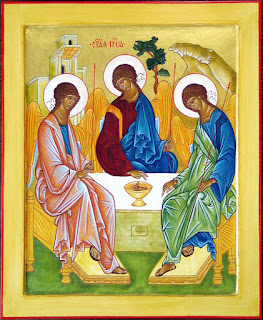The Mystery of Love
Gospel for Trinity Sunday: John 16.12-15
By far, my most memorable course when I was completing my Masters in Religious Education from Newman College was the one called the "Theology of the Trinity". There are a number of reasons for this.
One was definitely the brilliance of Fr. Don McDonald OFM, whose depth of understanding was a marvel.
It was also memorable because I had never worked so hard in a course in all my academic career. I started the major paper in the first week of the semester and continued to plug away at it - there was no last minute "creative spark" as was my usual method-if you could call it that.
Lastly, it was memorable because I received the highest mark I had ever received for a university course- and I was still no closer to understanding the mystery of the Holy Trinity.
And this is the point, I think, of why we celebrate Trinity Sunday. We need to experience the Word and partake of the Eucharist, so that we continue to enter into the mystery.
You see, you and I live in a world where mysteries are meant to be solved. Like an Agatha Christie novel. It's part of our modern age, where most believe that, if there are still mysteries out there, science will solve them.
But the mystery that is our God is not to be solved. The mystery is meant to be lived.
Throughout the ages, great thinkers, philosophers, theologians and saints have used images of light, triangles, shamrocks, candles and all sorts of things to shape meaning to our God who is beyond every thing.
Artists and iconographers have also attempted to express the inexpressible. Take a look at Andrei Rublev's icon at the top of the page. It depicts the three angels visiting Abraham at the Oaks of Mamre, but it also depicts the Trinity. There are some good explanations of the icon on the web- Here is one.
Note, for example, how each person of the Trinity is open to the other. There is a deep sense of community found in the Father, Son and Spirit.
It is a community of love.
It is a community which we enter into every time we celebrate Eucharist.
Yes it is a mystery. Love is a mystery. Not one to be solved. One to embrace.
Embrace the mystery!
Note, for example, how each person of the Trinity is open to the other. There is a deep sense of community found in the Father, Son and Spirit.
It is a community of love.
It is a community which we enter into every time we celebrate Eucharist.
Yes it is a mystery. Love is a mystery. Not one to be solved. One to embrace.
Embrace the mystery!




